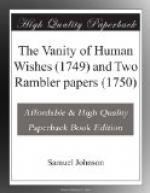Our Passions are therefore more strongly moved, in proportion as we can more readily adopt the Pains or Pleasures proposed to our Minds, by recognising them as once our own, or considering them as naturally incident to our State of Life. It is not easy for the most artful Writer to give us an Interest in Happiness or Misery, which we think ourselves never likely to feel, and with which we have never yet been made acquainted. Histories of the Downfall of Kingdoms, and Revolutions of Empires are read with great Tranquillity; the imperial Tragedy pleases common Auditors only by its Pomp of Ornament, and Grandeur of Ideas; and the Man whose Faculties have been engrossed by Business, and whose Heart never fluttered but at the Rise or Fall of Stocks, wonders how the Attention can be seized, or the Affections agitated by a Tale of Love.
Those parallel Circumstances, and kindred Images to which we readily conform our Minds, are, above all other Writings, to be found in Narratives of the Lives of particular Persons; and there seems therefore no Species of Writing more worthy of Cultivation than Biography, since none can be more delightful, or more useful, none can more certainly enchain the Heart by irresistible Interest, or more widely diffuse Instruction to every Diversity of Condition.
The general and rapid Narratives of History, which involve a thousand Fortunes in the Business of a Day, and complicate innumerable Incidents in one great Transaction, afford few Lessons applicable to private Life, which derives its Comforts and its Wretchedness from the right or wrong Management of Things that nothing but their Frequency makes considerable, Parva si non fiunt quotidie, says Pliny, and which can have no Place in those Relations which never descend below the Consultation of Senates, the Motions of Armies, and the Schemes of Conspirators.
I have often thought that there has rarely passed a Life of which a judicious and faithful Narrative would not be useful. For, not only every Man has in the mighty Mass of the World great Numbers in the same Condition with himself, to whom his Mistakes and Miscarriages, Escapes and Expedients would be of immediate and apparent Use; but there is such an Uniformity in the Life of Man, if it be considered apart from adventitious and separable Decorations and Disguises, that there is scarce any Possibility of Good or Ill, but is common to Humankind. A great Part of the Time of those who are placed at the greatest Distance by Fortune, or by Temper, must unavoidably pass in the same Manner; and though, when the Claims of Nature are satisfied, Caprice, and Vanity, and Accident, begin to produce Discriminations, and Peculiarities, yet the Eye is not very heedful, or quick, which cannot discover the same Causes still terminating their Influence in the same Effects, though sometimes accelerated, sometimes retarded, or perplexed by multiplied Combinations. We are all prompted by the same Motives, all deceived by the same Fallacies, all animated by Hope, obstructed by Danger, entangled by Desire, and seduced by Pleasure.




